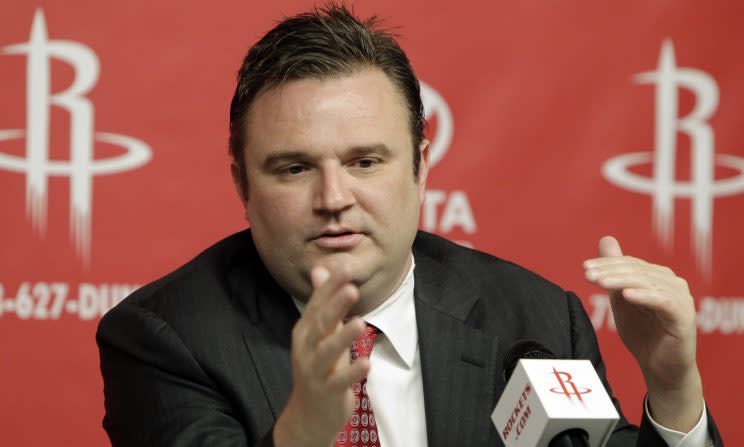Houston Rockets GM Daryl Morey suggests the NBA could make more money with fewer games

Pretty much everyone has weighed in on the NBA’s great rest debate, and that’s an understatement.
Former players disagree, with Karl Malone saying, “Get your a** out there,” and Steve Nash countering, “I could have used some rest.” Same goes for current players, as James Harden wants playing all 82 games to factor into the MVP conversation, Kevin Durant thinks the issue of resting only concerns stars and LeBron James believes it’s actually only a controversy because he’s the one who’s been resting.
Bad teams, like the Phoenix Suns and Los Angeles Lakers, are resting their top players in hopes of losing more games in the regular season, and good teams, like the Golden State Warriors and Cleveland Cavaliers, are resting theirs in hopes of winning more games in the postseason. Either way, the fans, whether they’ve purchased tickets or watch on TV, are getting a watered-down product.
All of which led ESPN.com’s Tom Haberstroh to pronounce the NBA’s 82-game regular season dead. While any suggestion the league might trim the schedule always elicits some version of, The owners would never give back the money they make on those extra games, Houston Rockets GM Daryl Morey — the MIT Sloan Analytics Conference co-founder who’s often referred to as a “genius” in basketball circles — offered a counterargument: Owners might actually make more money in a shorter season.
[Follow Ball Don’t Lie on social media: Twitter | Instagram | Facebook | Tumblr]
In essence, Morey’s theory goes, fewer games would heighten the importance of each contest, players would be less likely to take nights off as a result, and fans would be rewarded with a more meaningful viewing experience — not dissimilar to how the NFL has cashed in on a 16-game regular season.
“The idea that the NFL would make more money with 82 games is absurd,” Morey told Haberstroh. “Shorter schedule increases the importance of each game, which drives TV ratings, which drives the lion’s share of money for most top pro leagues.”
Comparing the NFL and NBA is apples to oranges. The idea that the NFL would make more money with 82 games is absurd, but the idea that the NBA could survive on a 16-game schedule is just as crazy.
But you get Morey’s point.
This season marked the first in a reported nine-year, $24 billion television deal with TNT and ESPN that won’t expire until 2025, so Morey’s approach would certainly have to be a long-term one. In the meantime, owners could increase ticket prices for those fewer games to make up the lost revenue — a matter of concern for the players as well, since they split earnings 50-50 with the league’s owners.
How that helps fans who buy tickets to see LeBron on his only trip through their city is another matter, especially when there’s still no guarantee he plays on a given night, but you don’t have to be a genius to understand the supply-and-demand economics of fewer, more meaningful basketball games.
But how many games is enough?
Morey doesn’t say in Haberstroh’s piece, but an Economist editor and an economics professor estimated 60-70. The Ringer’s Bill Simmons has long argued for a 76-game slate — four games apiece against four division opponents, three each against 10 remaining conference foes and two against all 15 out-of-conference teams. Many have called to abolish divisions and/or conferences altogether, most notably SB Nation’s Tom Ziller, and that might help get the NBA to anywhere from 58-72 games.
It seems like a long-shot the NBA could come to terms with eliminating more than a quarter of its season, and it’s debatable whether 6-10 fewer games would create Morey’s “scarcity” phenomenon.
Removing only a handful of games, however, would certainly curb the need for rest. Back-to-back games and four-games-in-five-nights stretches put the greatest strain on NBA players, and the league is already taking steps to limit those instances by reportedly starting the 2017-18 season even earlier.
NBA commissioner Adam Silver has stated his preference that stars rest during home games, so as not to rob other cities of their lone opportunity to see them play. In a memo sent to owners in the wake of the Warriors and Cavaliers resting their stars on successive Saturday night national TV games in March, Silver threatened “significant penalties” if teams fail to properly notify the public of resting players and moved the issue high on the list of concerns at Thursday’s scheduled board of governors meeting.
[Sign up for Yahoo Fantasy Baseball: It’s not too late to get in the game]
As Haberstroh noted, last month’s game in which the Cavs sat James, Kyrie Irving and Kevin Love vs. the Clippers drew “the lowest NBA rating ever on broadcast TV” — a matter of concern not helped by LeBron and Boston Celtics star Isaiah Thomas downplaying Wednesday’s marquee matchup on ESPN.
Such a trend could have a significant impact on not only the NBA’s relationship with its broadcast partners, but how the casual fan perceives the game. And that’s not good for anyone, especially owners and players. Something has to be done. What we’ve learned here is that even basketball geniuses don’t have a perfect plan. Morey’s plan might not create the desired scarcity effect, but shortening the NBA season could still improve the product, and that pays dividends in the long run.
So, if it takes the Rockets GM telling owners and players they’ll make more money in a shortened season to get them to agree it, that’s all the better. And maybe that’s just part of his genius plan.
– – – – – – –
Ben Rohrbach is a contributor for Ball Don’t Lie and Shutdown Corner on Yahoo Sports. Have a tip? Email him at rohrbach_ben@yahoo.com or follow him on Twitter! Follow @brohrbach



